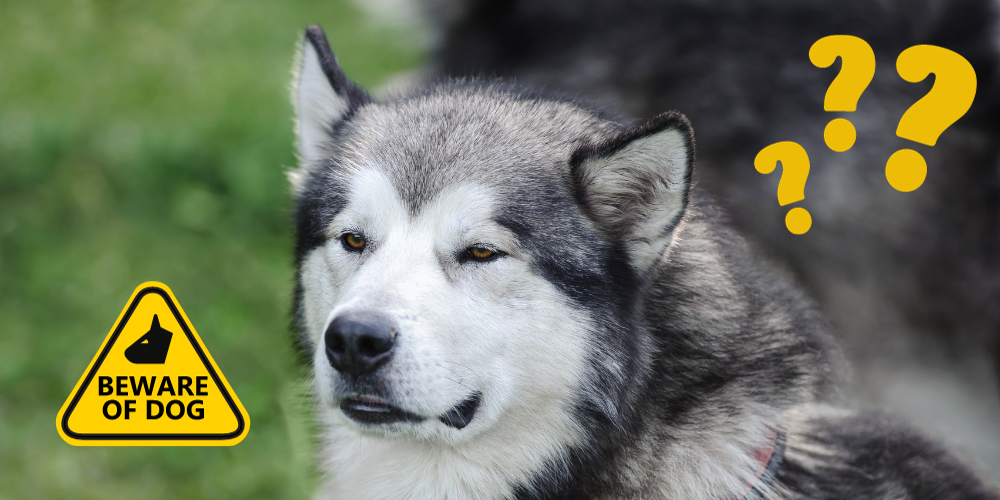Ever wondered if the majestic Alaskan Malamute could be your next security system? With their imposing size, it’s a tempting thought. But let’s cut to the chase: Are Alaskan Malamutes Good Guard Dogs?
Alaskan Malamutes are not good guard dogs. Despite their loyalty and imposing size, they lack the natural aggression and wariness toward strangers for effective guarding. They are inherently friendly and social, which makes them less suitable for guarding roles.
But don’t go just yet!
Stick around to find out why their friendly nature might be just what you’re looking for.
Alaskan Malamute: A Brief Overview
The Alaskan Malamute has its roots in the Mahlemut tribe of Alaska. Known for their imposing size, thick double coat, and a temperament that leans more towards friendly than ferocious, they are often mistaken for being good guard dogs.
However, looks can be deceiving, and it’s essential to understand their natural instincts and behaviors. For more on their general characteristics, look at this comprehensive guide.
What Makes a Good Guard Dog?
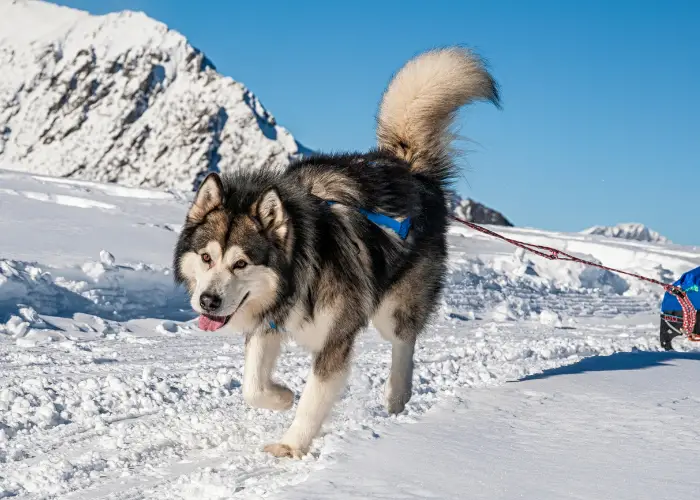
When it comes to identifying an ideal guard dog, there are several traits and characteristics that experts and veterinarians consider crucial. Here’s a breakdown:
- Size: A larger dog often serves as a more effective deterrent against intruders. However, size alone isn’t enough; the dog also needs the right temperament to act when necessary.
- Trainability: A dog that is easy to train is generally better suited for guard work. This trait allows the dog to learn commands and understand when to act and when to refrain.
- Natural Suspicion: A good guard dog is naturally wary or suspicious of strangers. This doesn’t mean the dog is aggressive, but rather that it is alert and aware of its surroundings.
- Loyalty to Family: A strong bond with the family is crucial. The dog needs to understand who it is protecting to be effective in its role.
- Physical Stamina: Guard dogs often need to patrol an area, which requires physical endurance. A dog that tires easily may not be the best choice for guarding.
- Intelligence: An intelligent dog can assess situations better and react appropriately, making intelligence valuable in a guard dog.
- Sound Sensitivity: Dogs with acute hearing can detect unusual sounds, adding an extra layer of security.
- Agility: The ability to move quickly and navigate obstacles is beneficial, especially in emergency situations.
Experts from reputable dog training institutions and veterinarians often cite these traits as essential for a guard dog. For a deeper understanding of what experts recommend, consider understanding unexpected aggressive behaviors in dogs.
Are Alaskan Malamutes Naturally Good Guard Dogs?
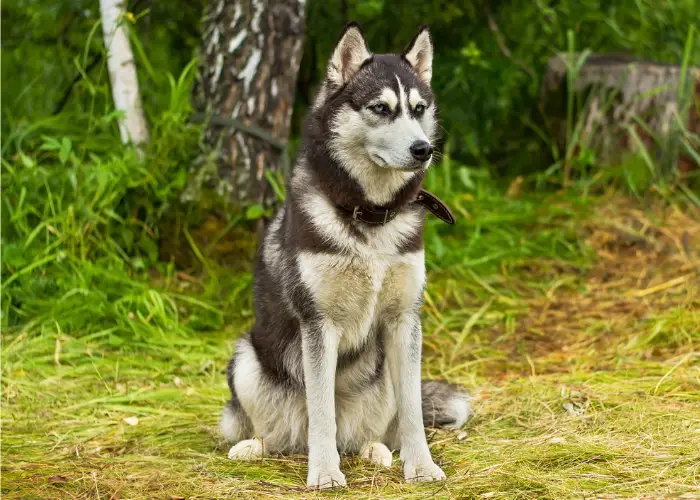
When it comes to the topic of Alaskan Malamutes as guard dogs, there’s a lot of conflicting information and misconceptions.
Many people are drawn to the breed’s imposing size and wolf-like appearance, mistakenly believing these traits make them natural protectors. However, the reality is quite different.
Friendly and Social Nature
Alaskan Malamutes are inherently friendly and social animals. They are known for their playful demeanor and willingness to engage with humans and other animals.
This friendly nature often extends to strangers, making them less effective as guard dogs who must be wary of unfamiliar people.
Lack of Natural Aggression
Alaskan Malamutes lack natural aggression, unlike other breeds specifically bred for guarding or protection work.
They are more likely to greet an intruder with a wagging tail than a growl or a bark. Their lack of suspicion towards strangers is one of the key reasons they are not naturally inclined to be guard dogs.
Expert Opinions and Studies
Various studies and surveys have been conducted on the guarding abilities of Alaskan Malamutes, and the consensus is clear: they are not natural protectors.
Experts in canine behavior and training often point out that while they can be trained to a certain extent, their natural instincts are not aligned with the traits required for effective guarding.
The Myth Debunked
Real-world experiences and academic research often debunk the myth of Alaskan Malamutes being natural protectors.
For those interested in a more detailed exploration of this topic, consider exploring the myths and realities of Alaskan Malamutes’ temperament.
The Reality: Pros and Cons
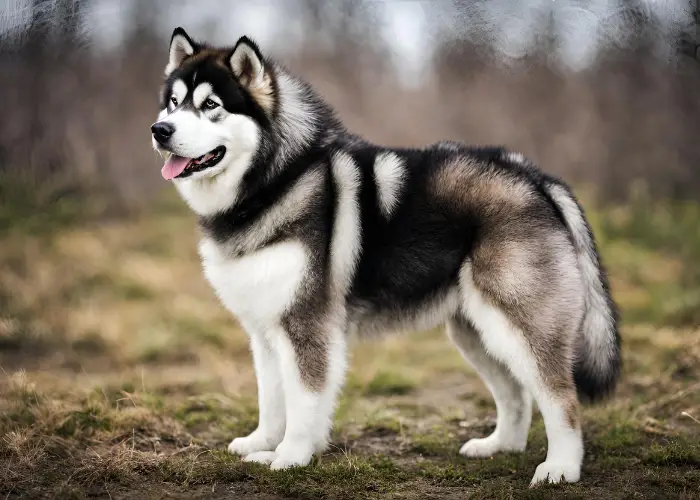
When considering an Alaskan Malamute for a guard dog, weighing the pros and cons is essential. Here’s a detailed breakdown:
Pros:
- Loyalty to Family: Alaskan Malamutes are known for their deep loyalty to their family members, making them emotionally attached and more likely to be protective in certain situations.
- Imposing Size: The sheer size of an Alaskan Malamute can act as a deterrent to potential intruders. Their large build and wolf-like appearance can be intimidating at first glance.
- Physical Strength: Their strong physique makes them more resilient and enduring, which could be beneficial in a protective setting.
- High Energy Levels: Alaskan Malamutes have a lot of energy and enjoy physical activities, which means they can be alert and active for extended periods.
Cons:
- Friendly Disposition: Their friendly nature, especially towards strangers, is a significant drawback when considering them for guarding duties.
- Lack of Natural Suspicion: Unlike breeds that are naturally wary of strangers, Alaskan Malamutes lack this trait, making them less effective as guard dogs.
- Training Challenges: Due to their independent nature, training them to be guard dogs can be challenging and time-consuming.
- Real-Life Examples and Studies: Both anecdotal evidence and academic research support the claim that Alaskan Malamutes are not ideal for guarding.
Training an Alaskan Malamute for Guarding: Is it Possible?
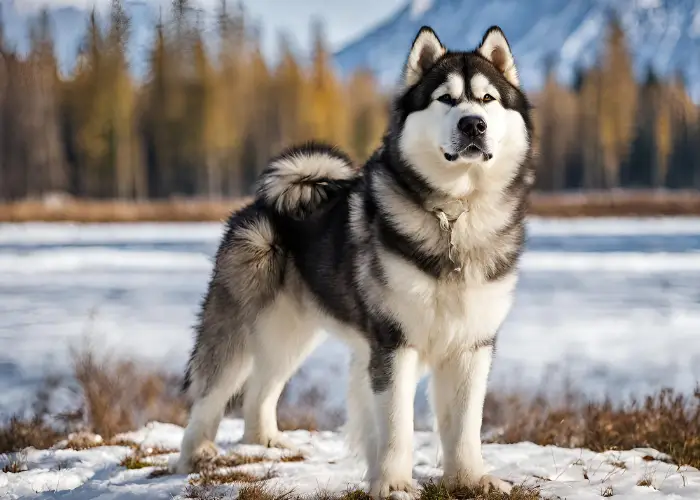
The question of whether an Alaskan Malamute can be trained to be a guard dog is a complex one. While it’s not entirely out of the realm of possibility, there are several factors to consider:
Independent Nature
- Strong-Willed: Alaskan Malamutes are known for their independent and strong-willed nature. This trait can make training more challenging as they may not always be willing to follow commands.
- Selective Listening: Due to their independence, they may choose when to listen and when to ignore commands, which can be problematic in high-stakes situations like guarding.
Training Techniques
- Positive Reinforcement: Positive reinforcement techniques can yield better results but are a long-term commitment.
- Consistency is Key: Consistent training sessions are crucial for instilling guarding behavior in Alaskan Malamutes.
Expert Opinions
- Specialized Training: Some dog trainers specialize in guard dog training, and they often recommend breeds other than Alaskan Malamutes for this specific role.
- Time and Effort: Experts suggest that while training them to be more guarded is possible, the time and effort often outweigh the benefits, especially when other breeds are naturally more inclined to guard.
Realistic Expectations
- Limited Guarding Abilities: Even with extensive training, an Alaskan Malamute’s guarding abilities will likely be limited compared to breeds naturally more inclined to this role.
While it’s not impossible to train an Alaskan Malamute to be more guarded, their independent and strong-willed nature makes it challenging.
Expert dog trainers specializing in guard dog training often recommend other breeds for those looking for a guard dog.
Alternatives to Alaskan Malamutes for Guarding
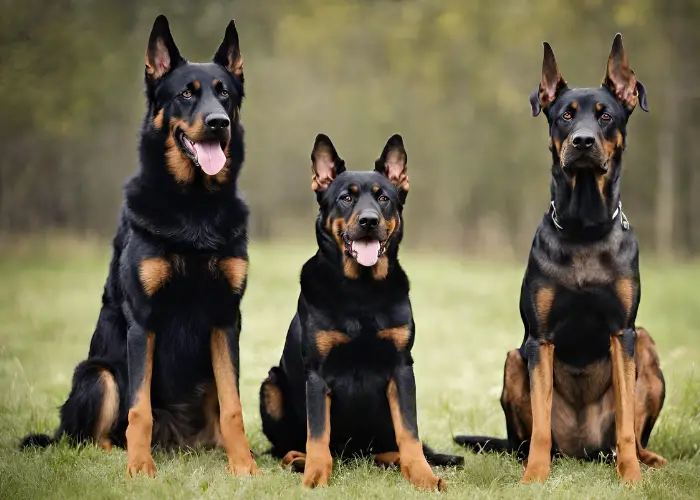
If your primary goal is to have a dog that excels in guarding, several breeds are better suited for this role than the Alaskan Malamute. Here’s a breakdown of some of the top alternatives:
German Shepherds
- Natural Protectors: German Shepherds are known for their natural guarding instincts and are often used in police and military work.
- Highly Trainable: One of the most trainable breeds, German Shepherds can learn various commands and tasks quickly.
- Loyal and Intelligent: Their loyalty to their family and high intelligence make them excellent guarding choices.
Rottweilers
- Strong and Sturdy: Rottweilers are robust and powerful, intimidating potential intruders.
- Natural Guarding Instincts: They are naturally inclined to guard their home and family, making them effective protectors.
- Trainability: While strong-willed, Rottweilers are also trainable, especially when using positive reinforcement techniques.
Other Breeds to Consider
- Doberman Pinschers: Known for their sleek build and high energy levels, they are also effective guard dogs.
- Boxers: While not as large as some other breeds, their alertness and natural suspicion make them good candidates for guarding.
- Bullmastiffs: Their imposing size and natural inclination to protect make them another alternative worth considering.
Comparison Factors
When choosing an alternative, consider the following factors:
- Size: Larger breeds are often more intimidating, acting as a natural deterrent.
- Trainability: The easier a dog is to train, the more effective it will be as a guard dog.
- Natural Instincts: Breeds with natural guarding instincts are generally more effective protectors.
Conclusion
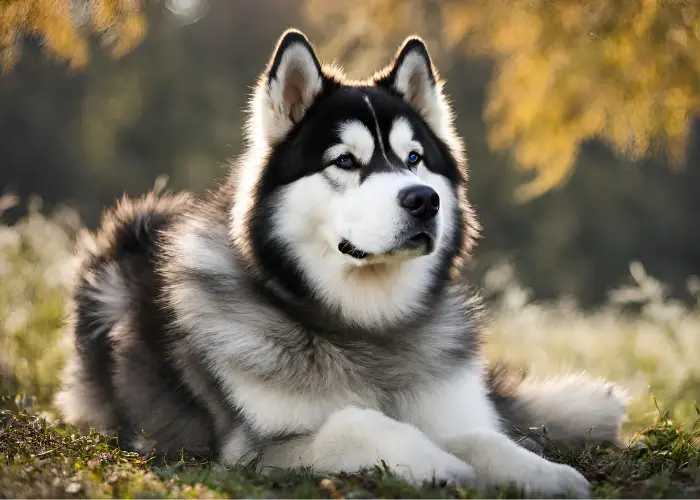
In closing, whether Alaskan Malamutes make good guard dogs requires careful consideration of various factors.
While they are undeniably loyal to their families and possess an imposing size that could deter potential intruders, these traits alone are insufficient to make them effective guard dogs.
One of the most significant drawbacks is their inherently friendly and social nature. Alaskan Malamutes are known for their playful demeanor and willingness to engage with humans and other animals.
This friendly disposition also extends to strangers, making them less effective in a role that requires a natural suspicion or wariness of unfamiliar people.
Moreover, their lack of natural aggression and guarding instincts further diminishes their suitability for this role.
Various studies and expert opinions corroborate this, often recommending other breeds naturally more inclined to guarding and protection work.
Therefore, while Alaskan Malamutes are magnificent creatures with many admirable qualities regarding guarding, they are not the most suitable choice.
Their friendly and social temperament and a lack of natural guarding instincts make them less ideal for those looking for a guard dog.
FAQ Section
Will an Alaskan Malamute protect its owner?
Alaskan Malamutes are loyal to their families but are not naturally inclined to be guard dogs. They lack the aggression and wariness towards strangers needed for effective protection.
Are Malamutes stronger than Huskies?
Yes, Alaskan Malamutes are generally stronger and larger than Siberian Huskies. They are bred for endurance and strength, making them more suitable for heavy pulling and laborious work.
What is the bite strength of an Alaskan Malamute?
The bite strength of an Alaskan Malamute is estimated to be around 230 pounds per square inch (PSI). This is strong but generally less than some other breeds bred specifically for guarding or protection.
References:
- Alaskan Malamute. (2023, June 18). In Wikipedia. https://en.wikipedia.org/wiki/Alaskan_Malamute
- Alaskan Malamute breed facts. Britannica. https://www.britannica.com/animal/Alaskan-Malamute
- Alaskan Malamute Dog Breed Information. American Kennel Club. https://www.akc.org/dog-breeds/alaskan-malamute/
- Breed-Specific Ancestry Studies and Genome-Wide Association Analysis Highlight an Association Between the MYH9 Gene and Heat Tolerance in Alaskan Sprint Racing Sled Dogs. National Center for Biotechnology Information. https://www.ncbi.nlm.nih.gov/pmc/articles/PMC3320045/
- Alaskan Malmute Breed Profile. Spokane County Regional Animal Protection Service. https://www.spokanecounty.org/DocumentCenter/View/1011/Alaskan-Malmute-PDF

